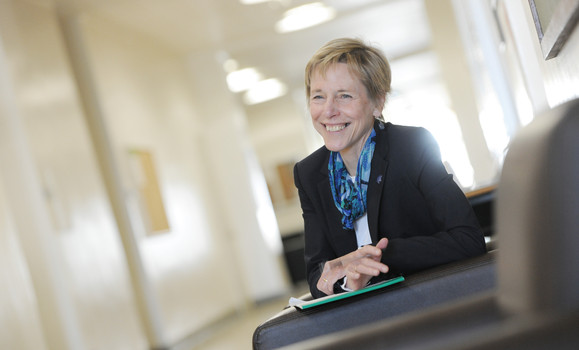Marty Leonard is a familiar face at Dal, but a new one within the Faculty of Graduate Studies.
This September Dr. Leonard, a longstanding member of the Department of Biology, took office as the Faculty’s new dean.
‚ÄúI came to Dal in 1993 to join the Department of Biology,‚ÄĚ she explains. ‚ÄúI came on what was then called a women‚Äôs faculty award. I have been at Dal ever since.‚ÄĚ Dr. Leonard has been a professor and researcher in the Department of Biology since her arrival, but she also served as the Dean of Science for a year through 2008 and 2009.
Many Science students might recognize her name from Introductory Biology, where she teaches a section on animal form and function. Others might know her from her third-year behavioural ecology course ‚ÄĒ a favorite of many Biology students.
Her research interests are primarily in animal communication and bird conservation. She shares a lab with her graduate students and husband, Andy Horn, who also teaches behavioural ecology and a popular field methods course in animal behavior.
‚ÄúIn my lab we do a mix of basic and applied conservation biology,‚ÄĚ she explains. Her graduate students work in a variety of topics, often trying to understand why a species has declined like it has or understanding how animals navigate the world. ‚ÄúMost of my students are doing projects with a focus on birds, but not exclusively,‚ÄĚ she says. ‚ÄúI‚Äôve had students that have worked on seals and bats, for example.‚ÄĚ
Dr. Leonard and Dr. Horn have recently began investigating the effects that human noise are having on bird communication. ‚ÄúHumans make a lot of noise,‚ÄĚ she explains. ‚ÄúThat noise is spreading to areas where it didn‚Äôt previously exist. Andy and I have looked at how this ambient or external noise interferes with communication between parents and young in birds.
Dr. Leonard has also acted as chair and bird specialist for the Committee on the Status of Endangered Wildlife in Canada.
Meeting diverse campus demands
Beyond being a graduate supervisor herself Dr. Leonard has long been passionate about graduate studies at Dal.
‚ÄúThere is a lot of variety and diversity in the types of programs that we offer,‚ÄĚ she says. ‚ÄúThat means that we can attract students from all over the world who are interested in different things. And we have fantastic faculty, together that creates a great environment for graduate students to flourish.‚ÄĚ

‚ÄúUsually I shy away from administrative jobs,‚ÄĚ she explains. But when the call came out early this year for a new dean of Graduate Studies, ‚ÄúI thought it would be a great chance to help facilitate better graduate student training and work to make things better for supervisors.‚ÄĚ
‚ÄúWhat I want to do in this office is find out what the issues are for students.‚ÄĚ And for their supervisors: ‚ÄúWhat are the barriers to taking more students? Some people feel that the barrier is funding; some people feel it‚Äôs space. For other people, the supervisor might not have enough time. We have to figure this out first, then work to facilitate things so it‚Äôs better for supervisors and their students.‚ÄĚ
Looking to the future
‚ÄúIt seems to me that there is a change in the way the we look at graduate training,‚ÄĚ she says. ‚ÄúFor doctoral students, there used to be a time when we really thought we were training them to be us, our replacements. What is obvious ‚ÄĒ and has been for quite some time ‚ÄĒ is that there just aren‚Äôt that many academic positions. Only a small percent of people in doctoral programs will end up as university professors, the rest will end up doing something else.‚ÄĚ
Dr. Leonard says that supervisors should be encouraged to prepare their students for those ‚Äėsomething elses.‚Äô ‚ÄúAre we actually giving them the skills they need?‚ÄĚ she asks. ‚ÄúWhat would it be like for them if we built in a little bit of policy training into their work? Or entrepreneurial skills?‚ÄĚ She says that no matter what they end up in their careers, ‚ÄúI‚Äôd like to see that we‚Äôre making sure all our students get adequate training.‚ÄĚ
‚ÄúI‚Äôm looking forward to this job,‚ÄĚ she says. ‚ÄúI feel like I‚Äôve barely gotten my feet wet. I‚Äôve been going out to visit and meet people working with graduate students across campus to get a feel for their Faculties. The FGS office and everyone here are professionals and they know what they‚Äôre doing and they do it well. Everyone has been welcoming and supportive of me; it‚Äôs fantastic.‚ÄĚ

